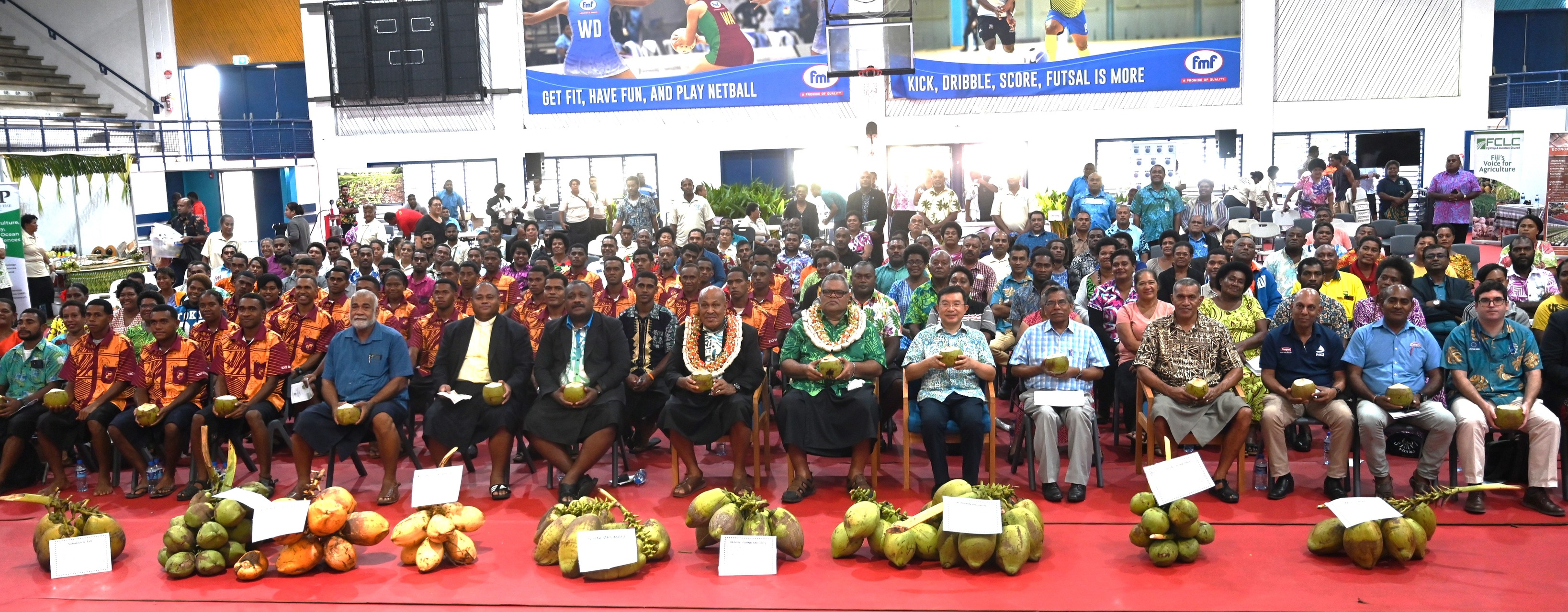A SPECIAL DAY TO HONOUR THE TREE OF LIFE
March 21, 2024

The National Coconut Day is
celebrated to honour one of nature’s most versatile and invaluable gifts to
mankind.
In opening the National Coconut Day celebrations today at the National Gymnasium in Suva, Minister for Agriculture and Waterways, Honourable Vatimi Rayalu said that the Coconut Day celebration holds a special place in the Ministry’s calendar.
“It allows us to recognize and
celebrate the immense contribution of the coconut tree to our lives, our
economy, and our environment. From its nutritious fruit to its myriad of
by-products, the coconut tree plays a vital role in various aspects of our
daily lives,” said Hon. Rayalu.
“Over the years, our nation has made significant strides in coconut cultivation, production, and value addition. Through the dedication and hard work of our farmers and the support of government initiatives, we have witnessed remarkable growth in the coconut industry over the years, contributing to our agricultural development and economic prosperity.”
“The Eastern Islands in the Lau Group and the Lomaiviti Group heavily rely on coconuts for sustenance, aesthetics, and cosmetics. The Coconut Industry plays a crucial role in the economic and social well-being of rural dwellers in the Eastern, Lomaiviti, and Northern Divisions,” he added.
Hon. Rayalu added that as we celebrate our achievements, we must also acknowledge the challenges that confront the coconut sector.
“Climate change, pests and diseases, market price fluctuations, and technological advancements pose both threats and opportunities. It is, therefore, imperative that we work together to address these challenges effectively and harness the potential of the coconut industry for sustainable growth and development.”
Before the devastating Tropical Cyclone Winston in 2016, the volume of coconut production in Fiji was around 23,855 tonnes. In 2018, the volume of coconut production stood at around 48,000 tonnes, which surged significantly to 100,000 tonnes in 2019. However, the volume dropped to approximately 80,000 tonnes in 2021 and 67,600 tonnes in 2022 and this was due to the catastrophic impacts of TC Harold, TC Yasa, and TC Ana respectively.
Given the abundant availability of coconuts in our rural areas, those living in these communities possess a comparative advantage in coconut production.
Hon. Rayalu went on to remind representatives on how the coconut tree is known as the “Tree of Abundance” due to its remarkable property of providing food, nutrition, aesthetic beauty, and various household materials.
“Every part of the coconut
tree, from the roots to the leaves, and its fruit can either be consumed by
humans or animals or converted into other valuable products. If properly
harnessed, the “Coconut” holds the highest economic value among the palm
family. This is why it is also referred to as the “Tree of Life”, the most
useful tree and king of tropical flora.”
Fiji boasts approximately 10 million coconut trees spread around 66,000 hectares of land. As one of nature’s most versatile products, the coconut plant and its various parts are utilized for food, drink, cosmetics, and decoration.
Coconuts are rich sources of electrolytes and lauric acid, contain numerous antioxidants, and possess antibacterial, antifungal, and antiviral properties.
With the theme, “Invest in Coconut for a Safe, Resilient and Sustainable Fiji’, this celebration serves as a profound call to action for everyone to plant at least one coconut tree in their compound.
Government remains fully committed to supporting and growing the Coconut Sector in Fiji and has invested $1.4 million to do this in this financial year.
Through this investment, the ministry aims to improve research and development, capacity building, market access initiatives, coconut farming, and value chains for the sector.
Government ministries, stakeholders, students and farmer representatives from across Fiji turned up in numbers to celebrate the importance of coconuts.
Plenary sessions was also held
to discuss the coconut market, replanting and production development as well as
the Value-adding and import and export trend.
